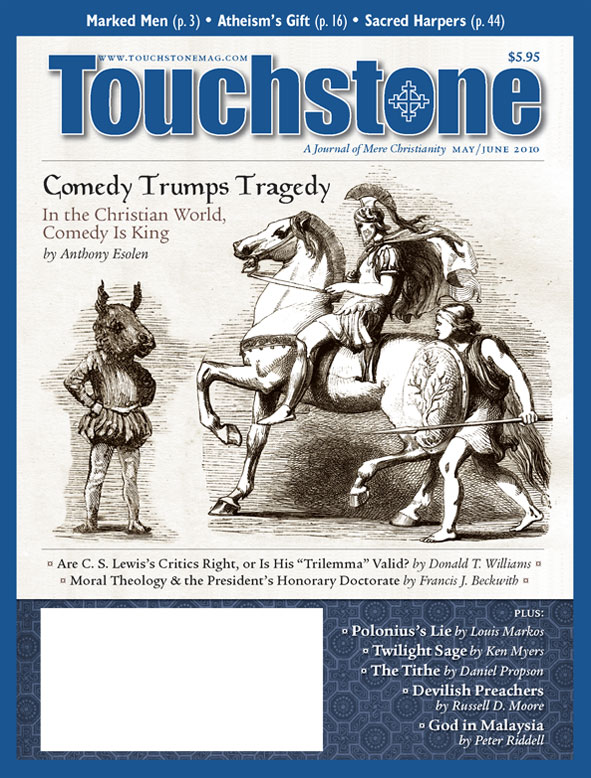Justice for Some
Moral Theology & the President’s Honorary Doctorate
by Francis J. Beckwith
Several years ago, after a pick-up basketball game, I got into a discussion with one of my teammates about a book I was reading on the Christian philosophy of religion. When I mentioned that the book claimed that a Christian may have rational warrant for his theological beliefs, my teammate, a committed believer in reincarnation, responded, “That may be true for you, but that’s not true for me.”
Puzzled by that response, I replied, “Is it true for both of us, or just true for you, that what may be true for me is not true for you?” Quickly losing confidence in his coffeehouse aphorism, he said he didn’t think it right that I was trying to push my religion on him.
I, of course, was suggesting that he was trying to push his religion, in particular, his religious epistemology, on me. For he was maintaining, whether he realized it or not, that in matters of religious epistemology, there is only one correct position, namely, that one’s theological beliefs can never rise to the level at which one may have warrant to call such beliefs “knowledge.” In other words, under the guise of openness and tolerance, he was, without my consent, dictating the epistemological terms under which I could announce my religious beliefs to others.
Belief & Knowledge
I suggest that the controversy surrounding President Barack Obama’s commencement address at the University of Notre Dame on May 17, 2009, manifested a conflict between two different understandings of the epistemological status of theological beliefs. On one side is the view that the deliverances of dogmatic and moral theology are integral parts of a knowledge tradition that may inform, and be informed by, all the disciplines in the academy. On the other side is the view that all theological claims are either church- or person-relative, and thus ineligible grounds for political action or public moral judgment.
For those who hold the second view, theology may never properly be described as knowledge, though it may be given the amorphous label “deeply held personal belief” or something similar. This cast of mind was manifested in the comments of 2004 Democratic presidential candidate John Kerry, a Catholic who believes that human life begins at conception but does not think this belief should be reflected in our laws. This is because a “belief,” in this philosophical taxonomy, doesn’t count as an item of knowledge that may defeat the deliverances of another person’s equally subjective “belief.”
Thus Senator Kerry could scold Pope John Paul II for “crossing the line” when a document issued by the Vatican suggested that Catholic politicians like Kerry should not support legislation allowing homosexual unions because “to vote in favor of a law so harmful to the common good is gravely immoral.” Kerry, in his reply, offered the requisite affirmation of faith—“I believe in the church and care about it enormously”—followed by the requisite disclaimer that it is, after all, just religion and has nothing important to say about anything of consequence—“But I think that it’s important to not have the church instructing politicians.” (Apparently, however, politicians may instruct the church about what it should consider important.)
It is this cast of mind that finds it difficult to believe that anyone not motivated by partisanship or unconscious bigotry would find it objectionable that the University of Notre Dame would award an honorary doctorate to a President of the United States who does not share the university’s “deeply held belief.” My goal is to explain why this cast of mind is mistaken.
Not Mere Opinion
Francis J. Beckwith is Professor of Philosophy and Church-State Studies at Baylor University. His most recent book is Politics for Christians: Statecraft as Soulcraft (InterVarsity Press, 2010). His writing can be found at www.francisbeckwith.com.
subscription options
Order
Print/Online Subscription

Get six issues (one year) of Touchstone PLUS full online access including pdf downloads for only $39.95. That's only $3.34 per month!
Order
Online Only
Subscription

Get a one-year full-access subscription to the Touchstone online archives for only $19.95. That's only $1.66 per month!
bulk subscriptions
Order Touchstone subscriptions in bulk and save $10 per sub! Each subscription includes 6 issues of Touchstone plus full online access to touchstonemag.com—including archives, videos, and pdf downloads of recent issues for only $29.95 each! Great for churches or study groups.
Transactions will be processed on a secure server.
more from the online archives
calling all readers
Please Donate
"There are magazines worth reading but few worth saving . . . Touchstone is just such a magazine."
—Alice von Hildebrand
"Here we do not concede one square millimeter of territory to falsehood, folly, contemporary sentimentality, or fashion. We speak the truth, and let God be our judge. . . . Touchstone is the one committedly Christian conservative journal."
—Anthony Esolen, Touchstone senior editor









